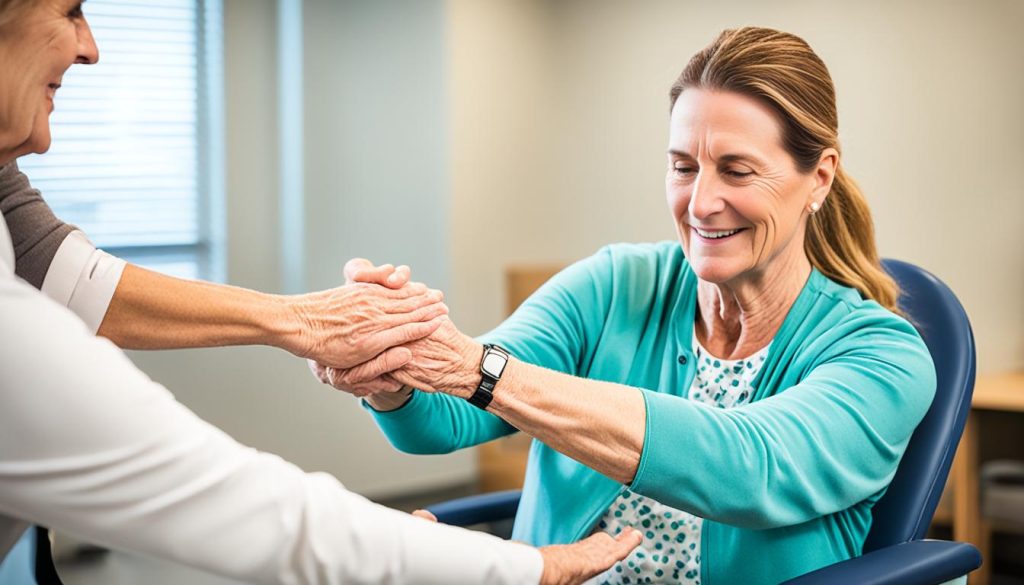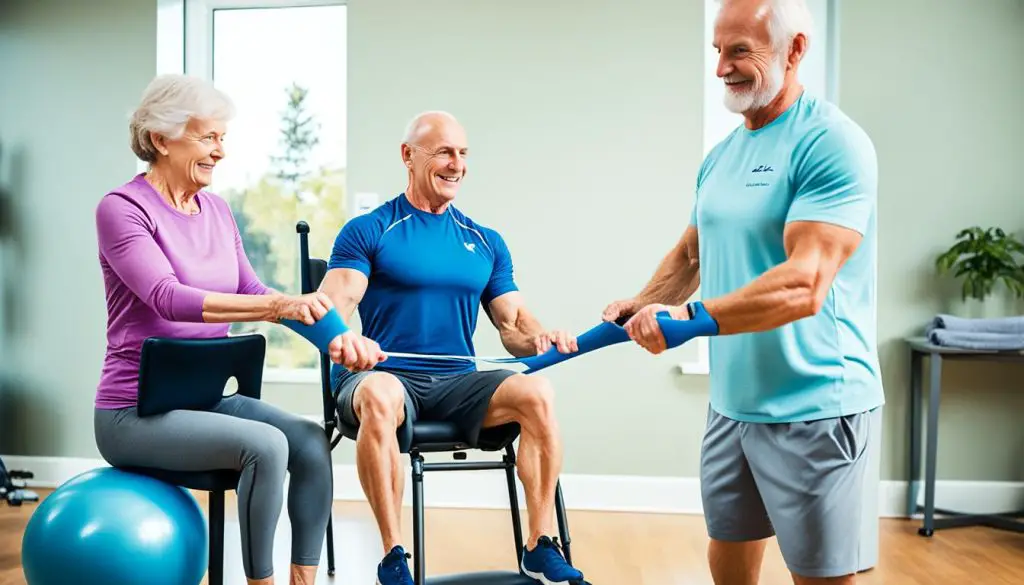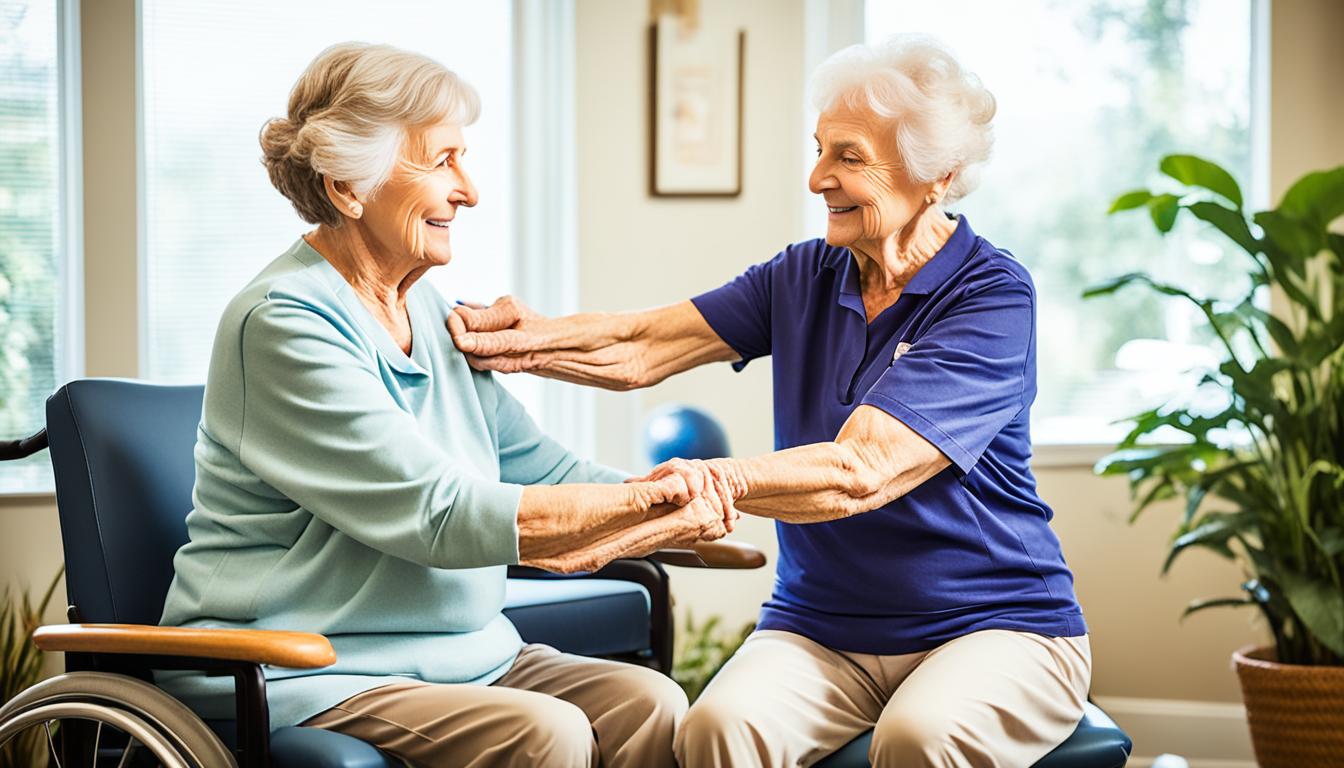As a man who spent a decade loving a woman with endometriosis and fibromyalgia, I have witnessed firsthand the challenges and complexities that come with caring for a partner with chronic illness. This journey has shaped me into the person I am today, with a deep understanding of the caregiver’s role in promoting physical therapy and overall well-being.
Through sharing my wife’s journey, I discovered the importance of home-based physical therapy in managing her conditions. It became evident that the comfort and familiarity of our own home played a significant role in her recovery. This realization sparked my love for blogging, providing an avenue for me to share our experiences, raise awareness about chronic illnesses, and offer support to others facing similar challenges.
Blogging has not only been therapeutic for me but has also allowed me to escape the “new normal” of living with chronic illness. It has become a source of advocacy as I use my platform to champion the importance of physical therapy at home and the vital role that caregivers play in facilitating it. By sharing our story, I hope to inspire and empower others in similar situations to actively participate in their loved ones’ physical therapy journeys.
Additionally, blogging has become an essential aspect of securing our future financially. As medical expenses can be overwhelming, the income generated from my blog contributes to our financial stability. This financial support allows us to prioritize my wife’s health and well-being and ensures that we can access the necessary resources for her physical therapy at home.
Through my experience as a caregiver and my passion for blogging, I have come to understand the crucial role that caregivers play in facilitating physical therapy at home. From managing treatment schedules and ensuring consistent treatments to providing emotional support and encouragement, caregivers have the power to positively impact treatment outcomes. By actively engaging in physical therapy and promoting its benefits, we can create a supportive and empowering environment for our loved ones, allowing them to thrive in their journey towards improved health and well-being.
The Importance of Effective Communication
Caregivers play a crucial role in physical therapy, serving as a vital link between physical therapists and patients. Effective communication between caregivers and therapists is essential for ensuring the success of the treatment and improving patient outcomes.
As a caregiver, you provide valuable information to physical therapists about the patient’s daily symptoms, medications, and overall health. This information is instrumental in developing comprehensive treatment plans tailored to the patient’s specific needs.
By observing and communicating changes in the patient’s condition, you can help therapists make necessary adjustments to the treatment. Your insights and observations enable therapists to provide the most effective care, enhancing the patient’s recovery process.
Furthermore, effective communication between caregivers and therapists enables the sharing of all relevant information, ensuring a holistic approach to the patient’s care. By keeping therapists informed about any changes or concerns, you contribute to the development of optimal treatment plans and the provision of personalized care.

The Role of Caregivers in Informing Physical Therapists
As a caregiver, you have a unique perspective on the patient’s condition as you spend significant time with them on a daily basis. This makes your input invaluable to physical therapists, as you can provide insights that may not be apparent during therapy sessions.
By keeping therapists informed about any changes in the patient’s symptoms or overall health, you enable them to make timely adjustments to the treatment plan. For example, if you notice increased pain or difficulty performing certain exercises, communicating this information to the therapist allows them to modify the treatment accordingly.
Additionally, you can inform therapists about any changes in the patient’s medications, ensuring that treatment plans align with the current medication regimen. This collaboration between caregivers and therapists promotes continuity and consistency in the patient’s care.
Facilitating Communication Between Caregivers and Therapists
Open and effective communication between caregivers and therapists is essential for the mutual understanding of the patient’s progress, concerns, and goals. Regular communication channels, such as meetings or phone calls, allow caregivers and therapists to exchange information and work together as a team.
During these communication sessions, you can share any observations or concerns regarding the patient’s progress, providing therapists with valuable feedback. Likewise, therapists can address any questions or provide guidance to enhance the effectiveness of the home-based physical therapy program.
Effective communication also includes actively engaging in dialogue with therapists, asking questions, and seeking clarification about the treatment plan. This collaborative approach ensures that everyone is on the same page and working towards the common goal of the patient’s improvement.
The Benefits of Caregiver’s Support in Physical Therapy
| Benefits of Caregiver’s Support | Description |
|---|---|
| Enhanced treatment effectiveness | By providing accurate and timely information, caregivers contribute to developing more effective treatment plans that address the patient’s specific needs. |
| Improved patient outcomes | The collaboration between caregivers and therapists ensures that the patient receives the best possible care, leading to improved physical functioning and overall well-being. |
| Patient motivation and compliance | Caregivers’ support and encouragement play a vital role in motivating patients to adhere to their treatment plans and perform prescribed exercises consistently. |
| Improved caregiver-patient relationship | Engaging in effective communication fosters trust and strengthens the relationship between the caregiver, patient, and therapist, creating a supportive environment for the patient’s recovery. |
Ensuring Consistent Treatments and Schedules
As a caregiver, your role in maintaining the effects of physical therapy goes beyond the supervised sessions. You play a critical role in supporting patients in adhering to their home exercise programs, ensuring that the prescribed exercises are performed correctly and consistently. By actively participating in their recovery journey, you can help patients maintain the progress they have achieved during therapy sessions.
One of the key responsibilities as a caregiver is coordinating therapy appointments. By assisting patients in scheduling and attending their sessions regularly, you contribute to the continuity of their treatment. This collaboration between therapists and caregivers ensures that the therapy plan remains on track and maximizes the chances of successful outcomes.
Consistency is crucial in physical therapy, and your dedication in coordinating the therapy appointments and helping patients follow their home exercise program is essential to their overall progress. By maintaining a routine and ensuring regular therapy sessions and exercises, you support the long-term effectiveness of the treatment.
The Caregiver’s Role in Treatment Adherence
To ensure treatment adherence, you can encourage and motivate patients to perform their prescribed exercises regularly. Remind them of the importance of consistency and the positive impact it can have on their recovery. Offering your assistance and being actively involved in their exercise routine can make a significant difference in their commitment and adherence.
Additionally, you can help patients track their progress by maintaining a record of their exercises and monitoring any improvements or challenges they may encounter. This record can serve as a visual reminder of their achievements and provide them with the motivation to continue their efforts.
Coordinating Therapy Appointments
In addition to facilitating treatment adherence, you can play a vital role in coordinating therapy appointments. By managing the scheduling and transportation logistics, you ensure that patients can attend their sessions without any obstacles. This level of coordination reduces any disruptions to their treatment plan and allows them to fully benefit from the therapy.
As a caregiver, you can communicate with therapists to ensure that appointments align with the patient’s availability and other responsibilities. By actively engaging in this coordination process, you contribute to a seamless treatment experience for the patient and reinforce the importance of therapy in their recovery journey.

By maintaining consistent treatments and schedules, caregivers play a crucial role in optimizing the outcomes of physical therapy. Your dedication, support, and coordination efforts contribute to the overall success of the treatment and help patients maintain the progress made during therapy at home.
Providing Emotional Support and Encouragement
Physical therapy can be a challenging and emotional process for patients, especially those recovering from serious illnesses or injuries. The journey to recovery often involves physical discomfort, limitations, and the need to adapt to new routines. During this time, caregivers play a crucial role in providing emotional support and encouragement.
Emotional support in physical therapy is vital for patients to stay motivated and maintain a positive mindset throughout their treatment. Caregivers have the unique privilege of being there every step of the way, offering a comforting presence, lending a listening ear, and providing words of encouragement.
By acknowledging the physical and emotional struggles patients face, caregivers create a safe space for them to express their concerns and fears. This validation not only helps patients feel heard and understood but also fosters a sense of trust and empathy.
Moreover, caregivers can motivate patients in their recovery journey by celebrating small milestones and progress. Recognizing and appreciating the patient’s efforts can go a long way in boosting their confidence and self-belief. Caregivers serve as cheerleaders, reminding patients of their resilience and inspiring them to continue pushing forward.

The Impact of Emotional Support on Treatment Outcomes
Research has shown that emotional support from caregivers can have a significant impact on treatment outcomes. When patients feel supported and encouraged, they are more likely to adhere to their treatment plans, actively participate in therapy sessions, and make the necessary lifestyle changes.
Emotional support helps patients maintain a positive mindset, which can contribute to reduced stress levels and improved overall well-being. This, in turn, enhances the effectiveness of physical therapy and promotes faster recovery.
Furthermore, when caregivers believe in the effectiveness of the treatment and convey this belief to the patient, it can create a powerful placebo effect. The patient’s confidence in the treatment’s efficacy can lead to improved motivation and engagement, accelerating their progress.
Ultimately, the caregiver’s impact on treatment outcomes extends beyond physical support. The emotional support and encouragement they provide contribute to a holistic approach to healing, addressing both the physical and emotional needs of the patient.
The Role of Caregivers in Home-Based Physical Therapy
Home-based physical therapy offers a convenient and comfortable way for patients to receive treatment in their own homes. Caregivers play a crucial role in facilitating this type of therapy, providing essential support and assistance to promote the patient’s recovery. In home-based physical therapy, caregivers are actively involved in assisting patients with their home therapy exercises, ensuring that they are performed correctly and safely.
Caregivers help create a safe and conducive environment for therapy sessions. They ensure that the necessary equipment and space are available, allowing patients to perform their exercises effectively. Additionally, caregivers provide any necessary modifications or adaptations to accommodate the patient’s specific needs, maximizing the benefits of the therapy.
The active involvement of caregivers in home-based physical therapy enhances its effectiveness. By closely monitoring and assisting patients with their exercises, caregivers ensure that the treatment plan is followed consistently, leading to improved outcomes. They also play a vital role in promoting patient independence, encouraging and motivating patients to continue their therapy even outside of supervised sessions.
Below is an example of a table showcasing the different home therapy exercises and the caregiver’s role in assisting and supporting the patient:
| Exercise | Caregiver’s Role |
|---|---|
| Range of motion exercises | Assist the patient in performing the exercises correctly, ensuring proper form and technique. |
| Strength training exercises | Provide any necessary support or modifications to help the patient perform the exercises safely and effectively. |
| Balance and coordination exercises | Ensure the patient’s safety during these exercises by providing physical support or holding onto them if needed. |
| Flexibility exercises | Assist the patient in stretching and maintaining proper alignment during these exercises for optimal results. |

In addition to supporting the physical aspect of home-based physical therapy, caregivers also provide emotional support and encouragement to patients. Their presence and encouragement can significantly impact the patient’s motivation and overall well-being, fostering a positive environment for recovery.
Overall, caregivers play an invaluable role in home-based physical therapy. Their active participation in assisting with home therapy exercises, creating a safe environment, and providing emotional support enhances the effectiveness of the treatment and contributes to the patient’s overall success and well-being.
Adapting to the New Normal with Chronic Illness
Caregivers of individuals with chronic illnesses face unique challenges in facilitating physical therapy at home. They often need to adapt to the “New Normal” of the patient’s condition and provide ongoing support and care. This may involve making lifestyle adjustments, such as modifying the home environment to accommodate the patient’s needs or helping the patient incorporate therapeutic exercises into their daily routines.
When loving a woman with a chronic illness, it is important for caregivers to understand the significant impact their support can have on her overall well-being. By embracing the New Normal and proactively adapting, caregivers can foster a sense of stability and resilience in both their loved one and themselves.
One of the key lifestyle adaptations caregivers can make is modifying the home environment to create a safe and comfortable space for physical therapy. This may include rearranging furniture, installing grab bars or ramps, or ensuring that necessary equipment is easily accessible. By creating an environment that supports independence and promotes a healthy lifestyle, caregivers can empower their loved ones to engage in physical therapy with confidence and ease.
Another aspect of adapting to the New Normal involves incorporating therapeutic exercises into the daily routines of the person with a chronic illness. Caregivers can help by encouraging and reminding their loved ones to perform prescribed exercises, accompanying them during their sessions, and offering support and motivation along the way. By integrating physical therapy into their daily lives, individuals with chronic illnesses can experience the ongoing benefits and maintain their functional abilities.
Benefits of Adapting to the New Normal:
- Enables individuals with chronic illnesses to maintain their independence
- Improves physical functioning and prevents decline
- Promotes a sense of empowerment and well-being
- Strengthens the caregiver-patient bond and fosters resilience
Adapting to the New Normal with chronic illness requires patience, understanding, and a collaborative mindset. It is essential for caregivers to communicate openly with their loved ones, healthcare professionals, and support networks to ensure that all necessary adaptations are made effectively. By embracing this journey together, caregivers can help their loved ones live fulfilling lives while managing their chronic illness and experiencing the benefits of physical therapy.
The Benefits of Home-Based Physical Therapy
Home-based physical therapy offers several advantages for patients, including personalized care in a familiar environment. Caregivers play a critical role in facilitating this type of therapy by ensuring that the patient is comfortable and has the necessary resources and equipment for the sessions.
One of the primary advantages of home-based physical therapy is the personalized care that patients receive. Being in their own home environment allows for a more tailored treatment plan that takes into account the specific needs and challenges of each individual. This personalized approach can lead to more effective and efficient therapy, resulting in better outcomes.
Another significant benefit is the convenience of home-based therapy. By eliminating the need to travel to a clinic or hospital, patients can save time, energy, and transportation costs. This is particularly beneficial for individuals with mobility issues or transportation limitations, who may find it challenging to access traditional physical therapy settings.
The role of caregivers in home-based physical therapy is instrumental in ensuring its success. Caregivers not only provide physical and emotional support but also create a supportive and conducive environment for the patient’s recovery. They ensure that the necessary resources and equipment are available and assist the patient during therapy sessions.
In summary, home-based physical therapy offers personalized care, convenience, and a comfortable environment for patients’ rehabilitation journeys. With the assistance of dedicated caregivers, this type of therapy can provide optimal results and empower patients to regain their independence and improve their overall well-being.
The Impact of Caregiver Support on Treatment Outcomes
Caregivers play a crucial role in the success of physical therapy outcomes. Their unwavering support and dedication significantly contribute to the patient’s recovery and overall treatment success. By providing motivation, encouragement, and hands-on assistance, caregivers empower patients to adhere to their treatment plans and experience better progress.
Consistent caregiver support ensures that patients receive the necessary guidance and assistance throughout their recovery journey. It fosters a collaborative and holistic approach to care, where therapists and caregivers work together to optimize treatment outcomes.
The Role of Caregivers
Caregivers play a multifaceted role in facilitating physical therapy and driving positive treatment outcomes. They not only provide physical assistance but also offer emotional support, creating a supportive environment that promotes the patient’s well-being and recovery.
- Motivation and Encouragement: Caregivers serve as a constant source of motivation and encouragement for patients. Their unwavering belief in the effectiveness of physical therapy inspires patients to stay committed to their treatment plans and strive for better recovery.
- Hands-on Assistance: Caregivers assist in various aspects of physical therapy, from helping patients perform exercises correctly to providing transportation to therapy sessions. Their active involvement ensures that the prescribed treatments are carried out effectively and consistently.
- Emotional Support: Physical therapy can be physically and emotionally challenging. Caregivers provide vital emotional support, offering a listening ear and comforting presence. This emotional support contributes to improved patient well-being and treatment outcomes.
The Power of Collaboration
The collaboration between therapists and caregivers is instrumental in achieving optimal treatment outcomes. By sharing insights into the patient’s daily symptoms, medications, and lifestyle, caregivers enable therapists to develop more personalized and effective treatment plans. This collaboration ensures that all relevant information is shared, leading to better-informed decisions and improved patient progress.
The holistic approach created through therapist-caregiver collaboration addresses the physical, emotional, and psychological aspects of the patient’s recovery. It amplifies the impact of physical therapy, resulting in enhanced physical functioning, a better quality of life, and increased patient satisfaction.
The Beneficial Impact on Patients
The impact of caregiver support on treatment outcomes cannot be overstated. Patients who receive dedicated support from their caregivers achieve better adherence to their treatment plans and experience improved physical functioning. Caregivers contribute to the patient’s recovery by fostering a positive and supportive environment that promotes healing.
Studies have shown that caregiver involvement positively influences treatment outcomes, reduces hospital readmissions, and enhances the overall success of physical therapy. By recognizing and appreciating the crucial role of caregivers, healthcare professionals can better support both patients and caregivers on their journey towards better health.
Challenges Faced by Caregivers in Physical Therapy
While caregivers play a vital role in facilitating physical therapy, they also face challenges and stress in this role. Providing ongoing care and support can be physically and emotionally demanding, leading to caregiver burnout. It is essential for caregivers to prioritize self-care, seek support from healthcare professionals and support groups, and establish a network of resources to help manage their own well-being. Recognizing and addressing the challenges faced by caregivers is crucial to ensuring the sustainability of their support and maintaining positive patient outcomes.
1. Caregiver Challenges in Physical Therapy
Being a caregiver in the context of physical therapy presents unique challenges. Caregivers may encounter difficulties in understanding and implementing complex treatment protocols, managing medical equipment, and coping with the physical demands of assisting patients with mobility and exercise.
2. Caregiver Stress and Burnout
The demanding nature of caregiving in physical therapy can lead to high levels of stress and eventual burnout. Caregivers may experience feelings of exhaustion, frustration, and overwhelmed with their responsibilities. These challenges can affect their own physical and mental well-being, potentially compromising the quality of care they provide.
3. Caregiver’s Emotional Well-being
The emotional toll of being a caregiver in physical therapy cannot be overlooked. Witnessing the struggles and frustrations of patients can evoke feelings of sadness, helplessness, and grief. Caregivers may also experience guilt or anxiety about not being able to alleviate the patient’s pain or accelerate their recovery. Prioritizing emotional well-being is essential for caregivers to effectively support their loved ones and maintain their own mental health.
4. Strategies for Caregiver Support and Self-Care
Recognizing the challenges faced by caregivers is the first step towards providing adequate support. Healthcare professionals can play a crucial role in offering guidance and resources to help caregivers navigate their roles effectively. Seeking support from support groups or online communities can provide valuable insights and a sense of belonging. Self-care practices such as engaging in activities that bring joy, seeking respite when needed, and maintaining a healthy work-life balance are vital in preventing caregiver burnout and promoting overall well-being.
5. The Impact of Caregiver Support on Patient Outcomes
The well-being of caregivers directly affects patient outcomes in physical therapy. When caregivers are adequately supported and their needs are met, they are better equipped to provide consistent and high-quality care. This, in turn, can positively impact patient motivation, adherence to treatment plans, and ultimately lead to better functional recovery and improved quality of life.
| Challenges | Effects on Caregivers | Impact on Patient Outcomes |
|---|---|---|
| Physical demands of caregiving | Physical exhaustion and strain | Decreased quality of care due to caregiver fatigue |
| Emotional burden | Mental health strain, feelings of sadness and helplessness | Lower caregiver morale and potential impact on patient motivation |
| Lack of support and resources | Increased stress levels and difficulty managing caregiving responsibilities | Decreased caregiver confidence and potential impact on treatment adherence |
Addressing these challenges through caregiver support programs, resources, and education can alleviate the burden on caregivers and enhance their ability to provide optimal care. By prioritizing caregiver well-being, we can ensure a sustainable and effective support system that promotes positive patient outcomes in physical therapy.
The Future of Caregiver Involvement in Physical Therapy
The evolving caregiver role in physical therapy is paving the way for a more comprehensive and collaborative approach to patient care. With a growing recognition of the impact caregivers have on treatment outcomes, efforts are being made to advance caregiver training and support. It is crucial to equip caregivers with the necessary skills and knowledge to effectively facilitate physical therapy at home.
Integrating caregivers into the care team is an essential step towards optimizing patient outcomes. By actively involving caregivers in treatment planning and decision-making processes, healthcare professionals can harness their valuable insights into the patient’s daily experiences, symptoms, and lifestyle. This integration allows for a more holistic and personalized approach to care, ultimately enhancing the effectiveness of physical therapy treatments.
The future holds great potential for the continued evolution of the caregiver’s role in physical therapy. As the importance of caregiver involvement becomes increasingly recognized, ongoing advancements in training and support programs will further empower caregivers. By fostering a collaborative environment where healthcare professionals, patients, and caregivers work together, we can ensure that every patient receives the comprehensive care they deserve.
